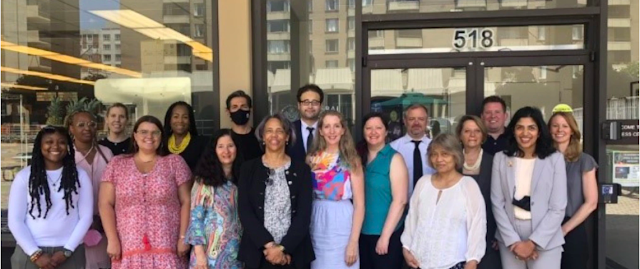In honor of the signing of the July 1990 Americans with Disabilities Act (ADA) – a historic win for the promotion of equal opportunities for persons with disabilities – two Workforce Recruitment Program (WRP) interns share their personal stories and experiences working for the U.S. Department of State. WRP is a recruitment and referral program connecting federal employers with highly motivated college students and recent graduates with disabilities. The State Department currently has eight WRP participants engaging in 10-week internships at various bureaus in the Department. To learn more about the program, visit the Workforce Recruitment Program site.
Gwyneth Murphy’s Story -
I have dreamed of working for the State Department since I was a little girl. For me, it represents the pinnacle of living a life in service to others and moving the needle bit-by-bit towards a world in which I feel proud to live. With this goal in mind, I began to build my human rights portfolio and dedicated my studies to extremism and mass violence at Georgetown University, while always looking for opportunities to serve at the State Department.
But the further I got in these efforts, the further away this dream felt. I frequently confronted discrimination due to my disabilities – at school, at other jobs, and in my personal life – and I started to wonder whether my disabilities meant a future in government service was out of reach. That is, until the accommodations office at Georgetown introduced me to WRP as an avenue into federal employment. My resume went into the WRP database, and when I was recruited by the State Department several months later, my doubts about my capability to serve began to fade.
I joined the Bureau of Democracy, Human Rights, and Labor (DRL) working on LGBTQI+ human rights issues under Special Envoy Jessica Stern as a WRP intern in May. Since then, I have helped execute and attend the Secretary’s Pride Reception, visited Blair House where I spoke with ambassadors to the U.S., and researched and written about injustices around the world – all as a part of my office’s broader efforts to promote and protect human rights.
Opportunities like this are once-in-a-lifetime, and through the WRP, I have gained invaluable skills and met talented, thoughtful colleagues. In speaking with other WRP interns at the State Department, I have found they had similar experiences. Muhammad Waheed, a WRP intern in the Bureau of Global Talent Management’s Office of Talent Acquisition, stated, “WRP allowed me to learn about accommodations in the workplace, network with a diverse team of colleagues, and gain many valuable experiences and skills.”
Above all, WRP and the State Department have reaffirmed for me that my disabilities are an asset, not a detriment, in government service. Ultimately, no career opportunity or accolade feels as good as realizing your dreams are still possible, no matter your background or identity, and the WRP has helped keep my dream alive.
Jake Goodman’s Story -
With a strong passion for foreign affairs and both environmental and disability rights policy, I have had a goal for several years to work at the State Department. Although I have had past internships and volunteer experiences working on environmental and disability rights policy, the WRP internship has been an entirely different experience.
As a WRP intern at the State Department, I work in the Bureau of Global Talent Management’s Office of Accessibility and Accommodations. In my few short weeks so far, I have worked on a range of projects, including helping to revise onboarding procedures and creating a resource library on reasonable accommodation policy for the Department.
In addition to the hands-on work experience, my WRP internship enables me to network and receive invaluable mentorship. My supervisor has been a great mentor and has introduced me to numerous connections both inside and outside our office. Everyone has made me feel very welcomed, and these connections will last beyond my 10-week internship. This has been a common sentiment among other WRP interns at the Department. Wes White, a WRP intern in the Bureau of Educational and Cultural Affairs, shared, “The WRP has provided me with the opportunity to work at the U.S. State Department – a dream job for me! The WRP has also allowed me to develop meaningful relationships with colleagues that will continue beyond my internship.”
At the State Department, I feel like I belong. I can make meaningful contributions without worrying about ableism or discrimination based on disability. I firmly believe public and private sector workforces in the U.S. will continue to become more inclusive of individuals with disabilities each year. It is of the utmost importance that individuals with disabilities continue to be engaged in foreign affairs in order to embody disability inclusion, be a model to the world, and ensure persons with disabilities are at the table discussing our foreign policy. It is through programs like the WRP that we make the State Department a more inclusive workplace for persons with disabilities.
Our stories as WRP interns at the State Department, along with the 32nd anniversary of the signing of the ADA this July, serve as reminders of why we must continue to view disability as a critical facet of broader diversity, equity, inclusion, and accessibility efforts. Engaging with and amplifying programs like the WRP is one way to ensure equal access to public service and demonstrate our longstanding commitment to countering the bias and discrimination that persons with disabilities face all around the world.


0 Comments